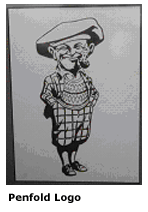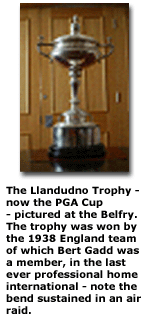|
BERT GADD:
PLAYING RECORD - PRE WAR continued |
|
1938 |
2nd
|
PENFOLD
LEAGUE TOURNAMENT (MATCH PLAY) |

|
| |
3rd |
DUNLOP
METROPOLITAN TOURNAMENT (283) |
| |
6th |
NEWS
CHRONICLE TOURNAMENT (303) |
| |
7th |
IRISH
OPEN CHAMPIONSHIP (302) |
| |
10th |
BRITISH
OPEN CHAMPIONSHIP (305) |
| |
|
|
|
1939 |
3rd |
PENFOLD
LEAGUE TOURNAMENT (MATCH PLAY) |
| |
6th |
SILVER
KING TOURNAMENT (288) |
| |
12th |
IRISH
OPEN CHAMPIONSHIP |
| |
|
|
|
INTERNATIONALS |
|
1933 |
|
ENGLAND
V SCOTLAND
ENGLAND V IRELAND |
 |
|
1934 |
|
RESERVE |
|
1935 |
|
ENGLAND
V SCOTLAND |
|
1938 |
|
ENGLAND
V SCOTLAND
ENGLAND V IRELAND
ENGLAND V WALES |
| |
| |
PLAYED
|
WON
|
HALVED
|
LOST |
| SINGLES
|
6
|
5 |
1
|
0 |
|
FOURSOMES |
6
|
4
|
0
|
2 |
|
| |
|
PENFOLD
LEAGUE TOURNAMENTS |
| |
|
PLAYED |
WON |
HALVED |
LOST |
POINTS |
|
1938 |
2nd |
11 |
5 |
5 |
1 |
15 |
|
1939 |
3rd |
11 |
7 |
0 |
4 |
14 |
|
FORMAT: ROUND
ROBIN – 12 TOP PLAYERS IN THE PROFESSIONAL
AVERAGES FROM THE PREVIOUS SEASON |
|
|
(Bert
Gadd’s record is not complete as Alliance records
pre-war have not yet been located. There were numerous
wins in the Birmingham Alliance where he was Gold
Medallist from 1932 to 1935. He was also active in the
Liverpool Alliance for four years from 1936 to 1939 and
may well have met with some success in that region)
* † The Northern Professional Championship dates from
1920 and the original trophy, the Manchester Guardian
cup, which was won outright by Arthur Havers in 1922
following two consecutive victories, was eventually
returned to the West Lancashire Golf Club, where he was
the professional at that time. The following year Gene
Sarazen took the title at Lytham, followed by the first
of George Gadd’s two victories in 1924. Abe Mitchell
won, also at Lytham, in 1925; George Gadd won again in
1926 and Charles Gadd’s courageous victory on his ‘home
green’ at Brancepeth Castle came in 1930. A Gadd
brothers treble was prevented by Percy Alliss when he
successfully defended the title in 1937, beating Bert
Gadd into second place by two shots.
The trophy – or trophies - played for in the late
twenties and thirties have not been found and may not to
have survived the war. |